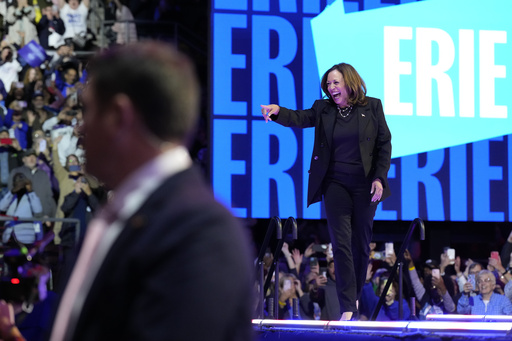MILWAUKEE — With just three weeks remaining in the presidential campaign, Democratic Vice President Kamala Harris is intensively focusing on securing support in key “blue wall” states such as Pennsylvania, Michigan, and Wisconsin. This strategy is particularly crucial as the campaign seeks to prevent a recurrence of the setbacks experienced by Hillary Clinton in these states eight years ago.
On Monday, Harris held an event at a hockey rink in Erie, Pennsylvania, where she criticized Republican nominee Donald Trump, describing him as “unhinged.” The following day, she made appearances at an art gallery in Detroit alongside actors Don Cheadle, Delroy Lindo, and Cornelius Smith Jr., and also participated in a radio town hall with Charlamagne tha God.
Returning to Pennsylvania on Wednesday, Harris emphasized her commitment to the Constitution while standing near the Delaware River, a historic crossing point for George Washington during the Revolutionary War.
The Vice President’s campaign schedule remains packed. On Thursday, she is set to attend three events in Wisconsin, highlighted by a meet-and-greet with students at the University of Wisconsin-Milwaukee, and another three events in Michigan on Friday, culminating in a campaign rally in Detroit on Saturday. Her efforts in these pivotal states are crucial, as any losses within this traditionally Democratic stronghold could severely hinder her chances for the presidency.
“You don’t take those states for granted. And she’s not,” remarked Joel Benenson, a Democratic pollster and former chief strategist for Clinton. He did note the grave consequences of previous complacency, referencing the campaign’s overconfidence that led to a lack of polling in these critical Midwest battlegrounds.
Harris’ campaign is not entirely abandoning states in the Sun Belt, which includes North Carolina, Georgia, Arizona, and Nevada. After being in North Carolina over the weekend, she plans to return to Georgia soon. However, her current itinerary suggests a laser focus on the states that could provide the clearest path to victory.
Democratic pollster Celinda Lake emphasized that while there are multiple routes to the presidency, winning states like Pennsylvania and Michigan is paramount. She stated, “If you can’t win Pennsylvania or Michigan, do you really think you can win Georgia or North Carolina?” Data shows that Harris has made eight public stops each in both Pennsylvania and Michigan since Labor Day, illustrating her prioritization of these vital states.
During a recent event in Washington Crossing, a participant echoed the sentiment regarding the dangers of complacency felt in the previous election. “In 2016, we thought we had it, you know, we thought we were okay,” said Melanie Woods, a retired principal who traveled from Brooklyn to attend. “And I don’t think you can ever take anything for granted any more.”
Dan Kanninen, who oversees battleground state operations for Harris, mentioned that there are “multiple pathways” for victory. He affirmed that all seven battleground states are competitive and will be closely contested, prompting continued voter engagement across these regions until Election Day.
In her campaign travels, Harris is strategically focusing on specific issues relevant to each area, such as advocating for auto jobs and union membership in Detroit, as well as unveiling proposed immigration reforms in Douglas, Arizona.
The campaign is also leveraging widespread organizational infrastructures in key states, coordinating closely with state Democratic parties to maximize outreach in her absence. High-profile surrogates like Minnesota Governor Tim Walz are activated to maintain momentum across critical areas.
Furthermore, Democrats benefit from having a solid group of prominent politicians supporting Harris, including former President Barack Obama, who is actively participating in campaign events. With also a larger campaign budget than Trump, Harris is able to carry out extensive advertising and voter mobilization efforts.
The electoral landscape for Democrats has oscillated throughout this eventful election year. President Joe Biden faced challenges in his reelection bid, but after his withdrawal from the race in July, Harris’ team has highlighted her broader regional appeal.
“Vice President Harris enters a tight race, but it is clear that she can bring together a coalition of voters to keep a wide set of states in play,” Campaign Chair Jen O’Malley Dillon noted in a memo from late July.
However, some states carry more weight than others in the electoral discussion. As Senator John Fetterman pointed out at a recent rally in Erie, “You win Pennsylvania, and you’re the next president.”
In contrast, Trump’s travel itinerary appears broader this week, featuring stops in several states including Pennsylvania, Illinois, Georgia, and Florida. He is also scheduled to participate in the Al Smith charity dinner in New York, before returning to Detroit.
Trump previously stirred controversy during a rally in Detroit, criticizing the city, which has been in the process of revitalizing after enduring tough economic times. “Our whole country will end up being like Detroit if she’s your president,” he remarked. This sentiment was challenged by local business owner Tommey Walker, who defended the city while introducing Harris, declaring, “Now it’s Detroit versus Donald Trump.”
Harris, by contrast, spoke affectionately of Detroit, reminiscing about the connections she made while studying at Howard University. “I just feel a kindred spirit whenever I come to Detroit,” she expressed.


